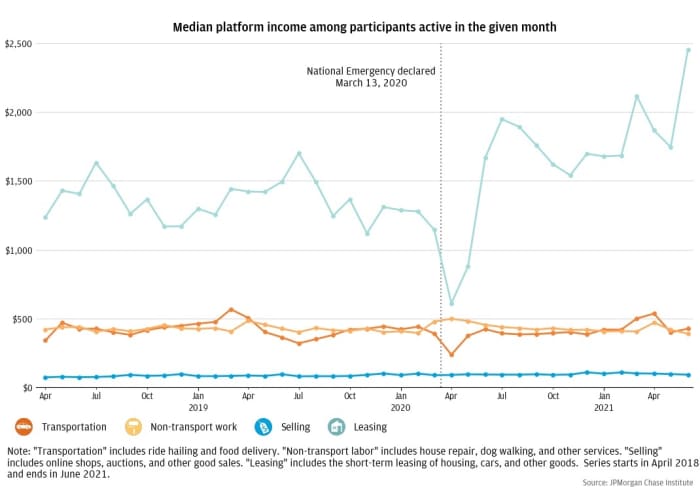When lockdowns began to stop the spread of COVID-19 last year, many rideshare drivers, delivery people and other gig workers stopped working.
But the ones that took on the most risk and continued to work — in some cases to transport essential workers and deliver food to people quarantined with COVID-19 —- were rewarded.
“In the months leading up to the pandemic, some 2.5% of American families earned income from doing gig work”
These workers earned more during the pandemic than they did from gig jobs prior to the pandemic, according to a report published by the JPMorgan Chase Institute JPM, +1.21%.
In the months leading up to the pandemic, some 2.5% of American families earned income from doing gig work, according to the report, which drew upon data from 38 million Chase personal checking accounts; identifying details had been removed from the accounts.
But at the onset of the pandemic, that figure dropped to 1.9% of families each month earning money from doing gig work, a 25% decline from pre-pandemic levels.

At the same time, median monthly income for drivers, non-transport workers such as dog walkers, and online sellers for the most part hovered at their pre-pandemic levels of $ 500 a month for transport and non-transport work, and $ 100 a month for online sellers.
That implies “an increase in overall income among platform participants during the pandemic,” the authors of the report, Fiona Greig, co-president of JPMorgan Chase Institute, and Daniel M. Sullivan, consumer research lead there, wrote.
In contrast, people who worked in the gig economy by renting out their homes or cars saw a large jump in median monthly earnings during the pandemic compared to before it.
That’s either because fewer people rented homes or cars during the pandemic and the ones who continued to had more inventory to offload — resulting in an uptick in revenue. Or, “It could reflect an increase in prices or longer-term rentals as families adjusted to pandemic lifestyle,” Greig and Sullivan wrote.
